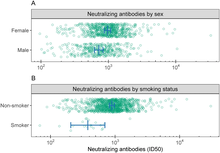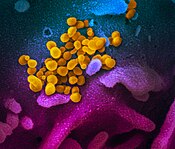New study analyzes the varying levels of protection offered by COVID-19 vaccines
Friday, May 12, 2023
Correction — May 16, 2023
The article originally said subjects who smoked had 240% less antibodies than those who didn't. The subjects who smoked had -240% the number of antibodies.

Image: Prather et.al.
A study in the United States by researchers at the University of California, San Francisco (UCSF) concluded COVID-19 vaccines offer varying degrees of protection in the six months after patients receive them. The study was published in the journal Scientific Reports on Tuesday.
498 volunteers, ages 18 to 88 participated in the BOOST study (Building Optimal antibOdies STudy). Researchers measured levels of COVID-19 neutralizing antibodies to the Pfizer, Moderna, and Johnson & Johnson vaccines.
One month after receiving their vaccinations the volunteers who received the Pfizer vaccine had an antibody response 21 times higher than the volunteers who received Johnson & Johnson and those in the Moderna group showed a vaccine response 51 times higher than those in the Johnson & Johnson group. However, six months later the Johnson & Johnson group was producing antibodies greater than the group who took Pfizer and were equal to the volunteers in the Moderna group.
Dr. Aric Prather of the UCSF Department of Psychiatry and Behavioral Sciences, and the Weill Institute for Neurosciences highlighted this effect and noted that "While the mechanism for this increase is unknown, other smaller studies have suggested this trend, leading us to believe there are robust phenomena not specific to our sample."
While all three vaccines were shown to be effective the study evaluated other factors that would reduce the effectiveness of the vaccines. Men showed a 30% lower vaccine response than for women. Smokers showed the strongest reduction with measured antibodies being -240% those of nonsmokers. "Almost all of [the smokers] were unable to mount a strong antibody response," said senior author Dr. Elissa Epel, vice chair of the UCSF Department of Psychiatry and Behavioral Sciences.
The study was funded by the National Institute on Aging.
Sources
- Suzanne Leigh. "Does Your Vaccine Type Matter in the Battle Against COVID?" — University of California, San Francisco, May 9, 2023
- Marianne Favro. "UCSF Researchers Study Degrees of COVID-19 Vaccine Protection" — KNTV, May 9, 2023
External links
- Prather, A.A., Dutcher, E.G., Robinson, J. et al.. "Predictors of long-term neutralizing antibody titers following COVID-19 vaccination by three vaccine types: the BOOST study." — Scientific Reports, May 9, 2023
